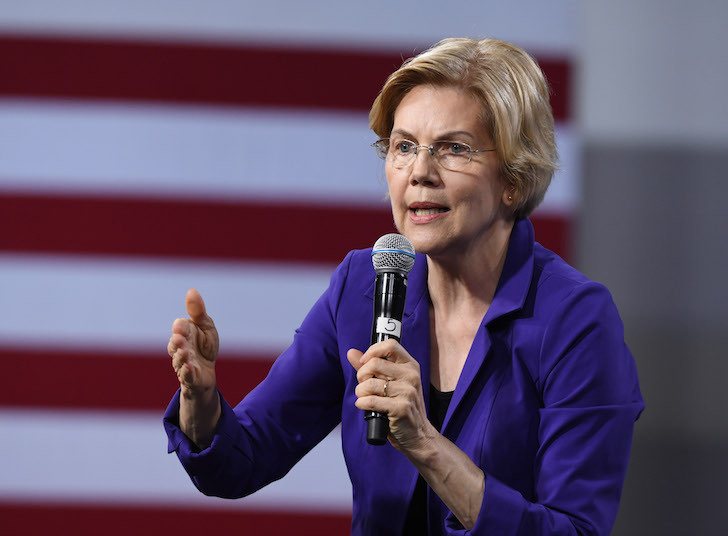Presidential candidate Elizabeth Warren's anti-lobbying tax appears to leave union lobbyists and other Democratic interests untouched.
Sen. Warren (D., Mass.) proposed to tax corporations and trade groups that hire lobbyists amid other reforms to crack down on what she calls "legalized bribery." The plan, which she debuted on Medium and her campaign website, made no mention of whether it would apply to lobbyists representing labor unions or other interest groups.
Paul Miller, president of the National Institute for Lobbying and Ethics, criticized Warren's selective lobbying tax as a "political gimmick" that punishes all lobbying activities except those that benefit the senator. He said her "very specific talk about corporate lobbyists" indicates that the same measures would not apply to ideological or labor lobbyists.
"It spells out things that corporate lobbyists would not be able to do, but it does not make the same points for labor lobbyists," Miller, a registered lobbyist, told the Washington Free Beacon. "A lobbyist is a lobbyist. I don't care if you represent corporate interests or labor issues. The law should apply to everybody."
Warren's campaign did not respond to requests for comment about the details of the plan.
Labor union lobbying is a $50 million industry that employed about 400 lobbyists in 2018, according to the Center for Responsive Politics. Warren's punitive tax plan calls for progressively higher tax rates—as high as 75 percent—for any business that spends more than $500,000 on lobbying. If such a standard were applied to labor unions in 2018, 13 would have to pay a 60 percent tax on their lobbying spending, while 14 would pay a 35 percent tax.
Almost 90 percent of the donations from labor unions and union members went to Democrats, underwriting the campaign of many members of Congress, according to the Center for Responsive Politics. Warren has also benefited from union largesse, raking in $213,000 from labor donations in the 2020 cycle.
Jerry Hunter, former general counsel of the National Labor Relations Board (NLRB) and attorney at Bryan Cave Leighton Paisner, noted that while corporations split their donations between the two parties, union lobbyists focus almost solely on Democrats.
"Unions are major contributors to members of Congress, particularly on the Democratic side," Hunter said. "That's clearly why Senator Warren and her proposed deal didn't say a word about unions being subject to it. She only wanted to go after the business side lobbyist."
Warren's policy plan would not just exempt labor unions from taxations, but actively strengthen their influence. She would use proceeds raised from the anti-lobbying tax to fund the "Office of the Public Advocate," an office that explicitly aims to amplify the voice of "workers and retirees" in government to counter corporate interests.
"This office will help the American people engage with federal agencies and fight for the public interest in the rule-making process," Warren said in her plan.
The office and other measures, she argued, are necessary to prevent corporate lobbyists from "killing widely popular proposals behind closed doors." Labor lobbyists use the same tactics on Capitol Hill, according to Hunter.
"The union lobby really puts a lot of time and effort into getting members of Congress and congressional committee—particularly in the House—to try to pressure the NLRB to not take certain positions on issues, and they do the same thing at the Labor Department," Hunter said. "When those committees write those [policy] letters, they have generally been contacted by the AFL-CIO or some union."
Several constitutional scholars have raised questions about whether Warren's proposal infringes on the First Amendment guarantee "to petition the Government for a redress of grievances." The limits of the tax could raise additional constitutional issues, according to Hans von Spakovsky, a senior legal fellow at the conservative Heritage Foundation.
"She's being selective in who she's deciding to punish for their First Amendment activities and that makes what she's trying to do very unconstitutional," he said.
Unions are not the only entities exempted from Warren's anti-lobbying tax. Ideological and single-issue organizations were also not mentioned. While the senator has previously criticized President Donald Trump for staffing his transition team with former lobbyists, Warren hired a Planned Parenthood lobbyist one day after she debuted her first anti-lobbyist plan.
Miller, the lobbying association president, said that Warren never responded to his requests to discuss the proposal.
"She doesn't like what we do, but that doesn't mean we should just trample all over the Constitution and tell people they don't have the right to petition the government just because she doesn't like the people we represent," he said.
